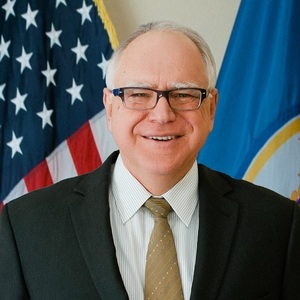Walz includes biofuel infrastructure funding in budget proposal

January 31, 2023
BY Erin Krueger
Minnesota Gov. Tim Walz has included a proposed $1.5 million in annual in biofuel infrastructure funding in his proposed budget, which was delivered to the state legislature on Jan. 24. The Minnesota Bio-Fuels Association (MN Bio-Fuels) is applauding the proposed funding.
In the proposed budget, Walz recommends an appropriation of $1.5 million be allocated for each fiscal year (FY) 2024-2027 under the state’s Agricultural Growth, Research and Innovation Biofuels Infrastructure Financial Assistance Program. Grands awarded under the program help service stations upgrade their equipment, such as fuel dispensers, underground tanks, and associated equipment, to enable the sale of gasoline blends containing 15 percent or more ethanol. According to the budget, grants are to be made to service stations within the state that are independently owned or belong to chains of 10 stations or less.
Advertisement
Advertisement
Budget documents show that the Minnesota Department of Commerce estimates that 435 of the 3,100 retails stations within the state currently offer E15. The Minnesota Pollution Control Agency estimates that only 15 percent of service-station sites are currently compatible with E15, meaning 85 percent of sites need equipment upgrades. The total cost to bring all these stations to E15 compatibility is approximately $784 million, according to MPCA.
The Minnesota Department of Agriculture received $6 million in FY 2022-2023 funding for the Biofuels Infrastructure Financial Assistance Program, which also leveraged a $1 million contribution from the Minnesota Corn Growers Association. Grant applications requesting funds greatly exceeded the $7 million available for infrastructure upgrades. The budget documents estimate that the proposed $3 million recommendation per biennium would provide grants to approximately 20 retail fuel stations to enable the supply of E15 blends.
“We are pleased that Gov. Walz has proposed funding for Minnesota’s bio-based economy in his budget recommendations for the next biennium,” said Brian Werner, executive director at MN Bio-Fuels. “The strong investments for biofuel infrastructure and advanced biofuel production will lead to fewer greenhouse gas emissions, lower prices at the pump, and more economic opportunity for farmers and rural communities. We look forward to working with legislators in both parties and the Walz administration to see these critical resources advance through the budget process.”
Advertisement
Advertisement
“The biofuel infrastructure funding proposed by Governor Walz will help boost access to lower-cost, cleaner-burning E15 and higher-blend biofuels such as E85. Not only do these biofuel blends help Minnesotans save money at the pump; they also help reduce greenhouse gas emissions and drive economic vitality for farmers and rural communities,” said Richard Syverson, president, Minnesota Corn Growers Association. “We thank Governor Walz for including this funding in his budget and look forward to working with the governor and the Legislature to advance policies that increase access to biofuels.”
Related Stories
Iowa farmers have a new market opportunity for their 2025 soybean crop. Landus is expanding its Clean Fuel Regulation initiative, made possible by recent policy changes expected to increase Canada's demand for liquid biofuel.
Topsoe, a leading global provider of advanced technology and solutions for the energy transition, has been selected as the renewable diesel technology partner for CountryMark’s Mount Vernon, Indiana refinery.
Klobuchar, Moran introduce bipartisan legislation to support biorefineries, renewable chemicals, and biomanufacturing
Sens. Amy Klobuchar, D-Minn., and Jerry Moran, R-Kan., on July 31 announced the introduction of the Ag BIO Act. The legislation aims to update the USDA’s loan guarantee program to better support biorefining projects.
The U.S. exported 35,953.6 metric tons biodiesel and biodiesel blends of B30 or greater, according to data released by the USDA Foreign Agricultural Service on Aug. 5. Biodiesel imports were at 2,148.9 metric tons for the month.
XCF Global leverages Alfa Laval technology to enhance pretreatment capabilities at New Rise Reno facility
XCF Global Inc. on Aug. 5announced it leverages Alfa Laval Inc. pretreatment technology at its New Rise Reno biorefinery, a sustainable aviation fuel (SAF) plant located in Nevada. The pretreatment technology enhances feedstock flexibility at the plant.
Upcoming Events










